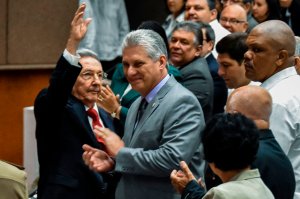Miguel Diaz-Canel was officially named as the new leader of Cuba on Thursday, one day after a vote in the country’s National Assembly.

It’s the first time in nearly six decades that Cuba is being led by a man not named Castro.
Diaz-Canel, 57, was selected as the unopposed candidate to replace Raul Castro, 86. Castro embraced Diaz-Canel — who wasn’t yet born when Fidel Castro led his revolution in 1959 — during Wednesday’s session, all but sealing his status as the island’s next president.
Raul Castro is still expected to exercise a large measure of control over the Cuban government and have the final say on important decisions. He will remain first secretary of the Communist Party of Cuba, a member of the National Assembly and, even if he is no longer president, the most powerful public figure on the island.
In remarks following the National Assembly’s announcement, Diaz-Canel acknowledged that Raul Castro would remain as the head of the armed forces, which runs much of the Cuban economy and tourism industry.
An electrical engineer by training, Díaz-Canel was born a year after Fidel Castro took power. Tall and gray-haired, he speaks in a soft monotone and rarely strays too far from the script in public appearances.
But while there were other, more dynamic members of his generation who years earlier appeared to have a better lock on the top job, Díaz-Canel quietly made a name for himself as an efficient administrator while serving as the top Communist Party official for the provinces of Villa Clara and then Holguín, where Fidel and Raul Castro were born.




















